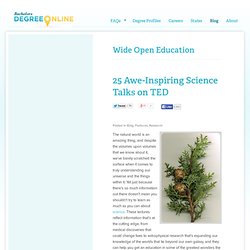

Discovery Channel : Science, History, Space, Tech, Sharks, News. The Curious Brain. Home. The Planetarium. Interactive 3D model of Solar System Planets and Night Sky. ASTRONOMIE. The Known Universe by AMNH. The History of Pretty Much Everything : Starts With A Bang. “Listen; there’s a hell of a good universe next door: let’s go.”

-e. e. cummings Sometimes, you just need to take stock of what we know, and appreciate how far we’ve come. A hundred years ago, we thought the Universe consisted of the stars and nebulae in our Milky Way. We thought Newton’s Law of Gravity governed it all, and that the other forces — electromagnetism and a few weird quantum things — were all there was. So why not — all in one article — go through the entire history of the Universe, from as early as we can say anything sensible to as late as we can say anything sensible? 25 Awe-Inspiring Science Talks on TED. The natural world is an amazing thing, and despite the volumes upon volumes that we know about it, we’ve barely scratched the surface when it comes to truly understanding our universe and the things within it.

Yet just because there’s so much information out there doesn’t mean you shouldn’t try to learn as much as you can about science. These lectures reflect information that’s at the cutting edge, from medical discoveries that could change lives to astrophysical research that’s expanding our knowledge of the worlds that lie beyond our own galaxy, and they can help you get an education in some of the greatest wonders the scientific fields have to offer. Brian Greene on string theory.